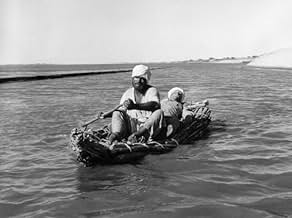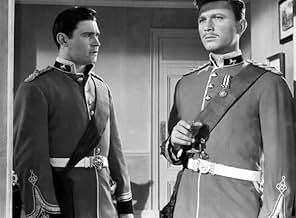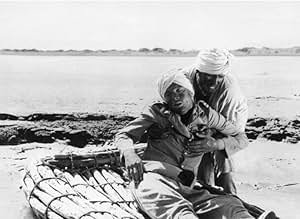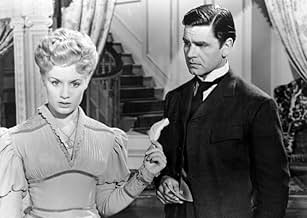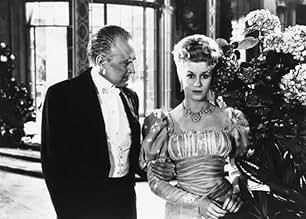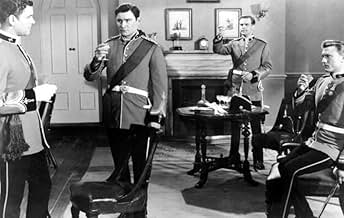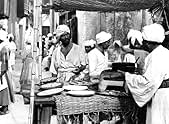AVALIAÇÃO DA IMDb
6,2/10
708
SUA AVALIAÇÃO
Adicionar um enredo no seu idiomaA British officer resigns his commission on the eve of his regiment's departure for war in Sudan. Accused of cowardice by his friends and the woman he loves, he sets out to prove his courage... Ler tudoA British officer resigns his commission on the eve of his regiment's departure for war in Sudan. Accused of cowardice by his friends and the woman he loves, he sets out to prove his courage to them. A remake of "The Four Feathers" (1939).A British officer resigns his commission on the eve of his regiment's departure for war in Sudan. Accused of cowardice by his friends and the woman he loves, he sets out to prove his courage to them. A remake of "The Four Feathers" (1939).
- Direção
- Roteiristas
- Artistas
Avaliações em destaque
A tepid remake of their spectacular 1939 version, one wonders what the Korda's where thinking. Indeed much of the location footage is recycled directly from the 1939 film including the whole final battle, aside from some closeups of the 1955 actors. Mildly entertaining, but the 1939 version is better, much much better.
If the name The Sudan is familiar today it is probably on account of the constant references to the exploits of his youth by Jonesy in 'Dad's Army' of the time he spent engaging the Mad Mahdi, briefly seen played by John Laurie in footage from the 1939 version.
Here you get a chance to see the thing played straight in this CinemaScope remake by Zoltan Korda of his classic thirties Ripping Yarn back in the days when Britain still had an empire.
Anthony Steel is a colourless substitute for John Clements as Harry Faversham and the less said about Lawrence Harvey in the role originally played by Ralph Richardson the better; but the late Mary Ure makes a charming and gracious heroine, while Osmond Borradaile's original location footage continued to give good value in this and a subsequent seventies version.
Here you get a chance to see the thing played straight in this CinemaScope remake by Zoltan Korda of his classic thirties Ripping Yarn back in the days when Britain still had an empire.
Anthony Steel is a colourless substitute for John Clements as Harry Faversham and the less said about Lawrence Harvey in the role originally played by Ralph Richardson the better; but the late Mary Ure makes a charming and gracious heroine, while Osmond Borradaile's original location footage continued to give good value in this and a subsequent seventies version.
I had the advantage of watching Zoltan Korda's 1939 'The Four Feathers' on one afternoon and this his 'Storm over the Nile' on the next and since there have been at least 5 versions filmed cannot understand why it was not issued as 'The Four Feathers' or more appropriately 'The Two Feathers' as those given to Lieutenants Thomas Willoughby and Peter Burroughs were largely irrelevant to the plot although getting Harry Faversham flogged in the original and just incarcerated in the second ? One could believe John Clements considered himself a Coward but not Anthony Steele. I would cross the street and a few deserts for Mary Ure but not June Duprez- she deserved the far from noble Ralph Richardson but not Laurence Harvey who started off the sequel. Laurence Harvey started off with a reddish brown rat on his forehead which might well have saved him from Retinal damage when his lost his Hat. Indeed it is hard to select a single Actor or Actress who was better in the original and usually considered superior version but that is after we have watched both. As a stand alone Storm over the Nile is both more watchable and allowed Zoltan Korda to clean up several nonsenses from his original. Such as how and why John Durrance became sun blind. Ralph Richardson leading his troops keeping that he was blind a secret. The hovering vultures and other reasons why LH tries more convincingly to shoot himself. How Harry Faversham passed over the so important File and the Mahdi's guards searching them for it. All in all certainly not deserving the criticism - who shouldn't any Director use the same footage twice or shoot an overlong schedule and then divide it into two ? Nobody has to pay to watch any Film or spend the time glued to the telly.
A lot of critics gave this movie a really hard time. I never read critical reviews until I've seen a film and I must confess that I thoroughly enjoyed this one. Maybe it did use footage from a previous shoot and there were certainly flaws. But all in all, this was a good schoolboy yarn. I liked the lengthy build up to the scenes in Sudan, it really helped set the scene and made you care about the characters. The plot lingered long enough to give the viewer a feel of the longevity of the piece. The plot was well moved along and there was suitable emotion shown. James Robertson Justice so often just barks out his lines and in this movie he....Well, just barked out his lines! A real shame. A small blemish on an otherwise enjoyable movie.
If you're going to clone something in Hollywood, clone something good which is what Storm Over The Nile is. It is yet another remake of the famous novel The Four Feathers. The same treatment was afforded Dawn Patrol by Warner Brothers back in the Thirties when the first version with Douglas Fairbanks, Jr. was cloned into the second with Errol Flynn.
The script from the classic British production from 1939 was used as well as all the battle sequences. That was a wise thing because in 1939 the British controlled the Sudan and were able to film their action sequences on the very spot where these things occurred back in the late 19th century. Not to mention that it certainly saved big time on the budget.
Anthony Steel plays our protagonist Harry Fevasham who questions his own courage when he's about to be shipped into action in the Sudan. Steel is from a military family and there are reasons of tradition and obligations that force him into that life. His brother officers brand him a coward and send him a white feather as the symbol of same.
Some time later Steel goes to the Sudan and lives as an Arab tribesman and in that role performs some truly heroic feats. Best as always is his saving Laurence Harvey who is one of his accusers who is now blind as a result of prolonged exposure to the desert sun. Harvey's role was done in 1939 by Ralph Richardson.
James Robertson Justice is also in the cast playing a really good John Bull type character. He's the father of Mary Ure who was supposed to marry Steel before his resignation and the feathers. JRJ always adds a lot to any film he's ever in.
The Four Feathers with its story about a man questioning his courage and finding out truly if he has the right stuff is in the British culture very much akin to The Red Badge Of Courage. That has only had one film adaption whereas The Four Feathers has had many. Beau Bridges did one in the Seventies and the late Heath Ledger starred as Harry Fevasham in the latest screen version.
But only the 1939 and 1955 can boast actual on scene location shooting. And unless the Sudan changes radically were not likely to see another.
The script from the classic British production from 1939 was used as well as all the battle sequences. That was a wise thing because in 1939 the British controlled the Sudan and were able to film their action sequences on the very spot where these things occurred back in the late 19th century. Not to mention that it certainly saved big time on the budget.
Anthony Steel plays our protagonist Harry Fevasham who questions his own courage when he's about to be shipped into action in the Sudan. Steel is from a military family and there are reasons of tradition and obligations that force him into that life. His brother officers brand him a coward and send him a white feather as the symbol of same.
Some time later Steel goes to the Sudan and lives as an Arab tribesman and in that role performs some truly heroic feats. Best as always is his saving Laurence Harvey who is one of his accusers who is now blind as a result of prolonged exposure to the desert sun. Harvey's role was done in 1939 by Ralph Richardson.
James Robertson Justice is also in the cast playing a really good John Bull type character. He's the father of Mary Ure who was supposed to marry Steel before his resignation and the feathers. JRJ always adds a lot to any film he's ever in.
The Four Feathers with its story about a man questioning his courage and finding out truly if he has the right stuff is in the British culture very much akin to The Red Badge Of Courage. That has only had one film adaption whereas The Four Feathers has had many. Beau Bridges did one in the Seventies and the late Heath Ledger starred as Harry Fevasham in the latest screen version.
But only the 1939 and 1955 can boast actual on scene location shooting. And unless the Sudan changes radically were not likely to see another.
Você sabia?
- CuriosidadesRe-used a great deal of stock footage from As Quatro Penas Brancas (1939), including the entire final battle sequence.
- Erros de gravaçãoHooded vultures are shown making many and various calls. The species, in common with other Old World vultures, is largely silent.
- Cenas durante ou pós-créditosOpening credits prologue: In 1885 the rebellious army of dervishes enslaved and killed many thousands of defenceless natives in the Sudan. Then laid siege to Khartoum. The scanty garrison's heroic commander, General Gordon appealed for help from England - but no help reached him.
- ConexõesEdited from As Quatro Penas Brancas (1939)
Principais escolhas
Faça login para avaliar e ver a lista de recomendações personalizadas
- How long is Storm Over the Nile?Fornecido pela Alexa
Detalhes
- Data de lançamento
- País de origem
- Idioma
- Também conhecido como
- Zoltan Korda's Production Storm Over the Nile
- Locações de filme
- Empresas de produção
- Consulte mais créditos da empresa na IMDbPro
- Tempo de duração
- 1 h 47 min(107 min)
- Proporção
- 2.55 : 1
Contribua para esta página
Sugerir uma alteração ou adicionar conteúdo ausente

